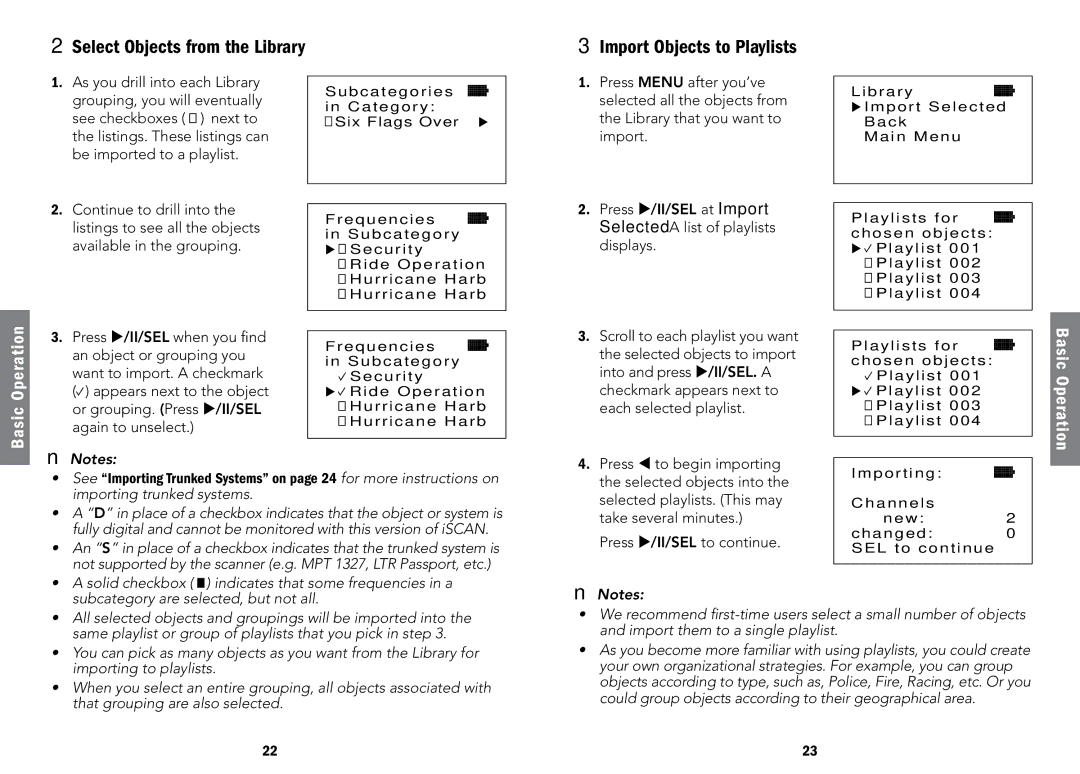
2 Select Objects from the Library
1.As you drill into each Library grouping, you will eventually see checkboxes ( ![]() ) next to the listings. These listings can be imported to a playlist.
) next to the listings. These listings can be imported to a playlist.
2.Continue to drill into the listings to see all the objects available in the grouping.
Subcategories
in Category:
![]()
![]() Six Flags Over
Six Flags Over
Frequencies
in Subcategory
![]() Security
Security
![]() Ride Operation
Ride Operation
![]() Hurricane Harb
Hurricane Harb
![]() Hurricane Harb
Hurricane Harb
3 Import Objects to Playlists
1.Press MENU after you’ve selected all the objects from the Library that you want to import.
2.Press /II/SEL at Import Selected. A list of playlists displays.
Library
Import Selected
Back
Main Menu
Playlists for chosen objects: Playlist 001
![]()
![]() Playlist 002
Playlist 002
![]()
![]() Playlist 003
Playlist 003 ![]()
![]() Playlist 004
Playlist 004
Basic Operation
3.Press /II/SEL when you find an object or grouping you want to import. A checkmark
(![]() ) appears next to the object or grouping. (Press /II/SEL again to unselect.)
) appears next to the object or grouping. (Press /II/SEL again to unselect.)
nNotes:
Frequencies
in Subcategory
![]() Security
Security
Ride Operation
![]()
![]() Hurricane Harb
Hurricane Harb
![]()
![]() Hurricane Harb
Hurricane Harb
3. | Scroll to each playlist you want |
| the selected objects to import |
| into and press /II/SEL. A |
| checkmark appears next to |
| each selected playlist. |
4. | Press to begin importing |
Playlists for chosen objects:
![]() Playlist 001 Playlist 002
Playlist 001 Playlist 002 ![]() Playlist 003
Playlist 003 ![]() Playlist 004
Playlist 004
Basic Operation
• See “Importing Trunked Systems” on page 24 for more instructions on |
importing trunked systems. |
• A “D” in place of a checkbox indicates that the object or system is |
fully digital and cannot be monitored with this version of iSCAN. |
• An “S” in place of a checkbox indicates that the trunked system is |
not supported by the scanner (e.g. MPT 1327, LTR Passport, etc.) |
• A solid checkbox ( ) indicates that some frequencies in a |
subcategory are selected, but not all. |
the selected objects into the |
selected playlists. (This may |
take several minutes.) |
Press /II/SEL to continue. |
nNotes:
Importing:
Channels
new: 2
changed: 0 SEL to continue
• All selected objects and groupings will be imported into the |
same playlist or group of playlists that you pick in step 3. |
• You can pick as many objects as you want from the Library for |
importing to playlists. |
• When you select an entire grouping, all objects associated with |
that grouping are also selected. |
22
•We recommend
•As you become more familiar with using playlists, you could create your own organizational strategies. For example, you can group objects according to type, such as, Police, Fire, Racing, etc. Or you could group objects according to their geographical area.
23
